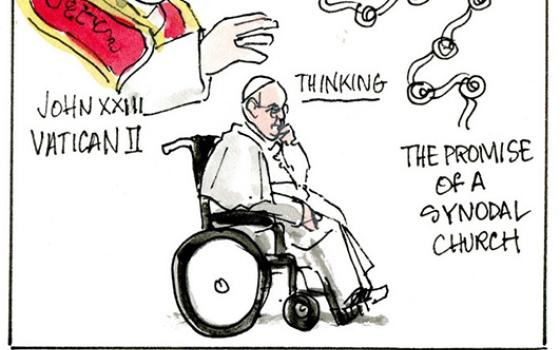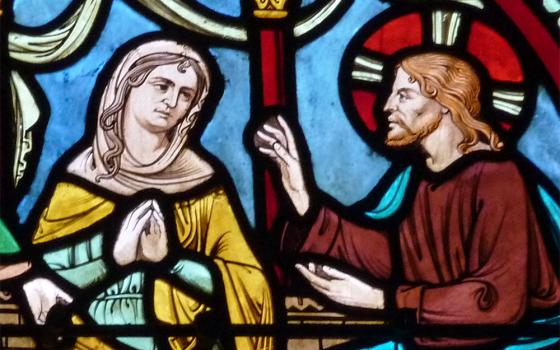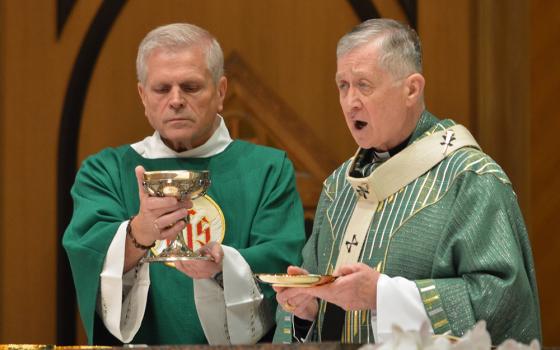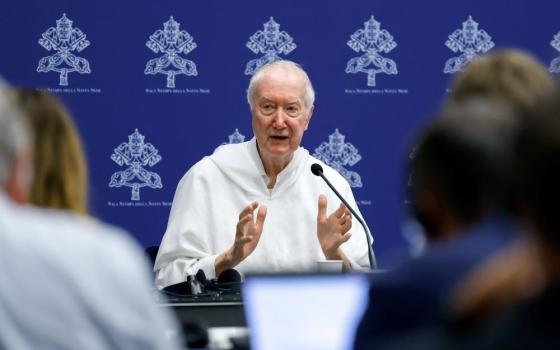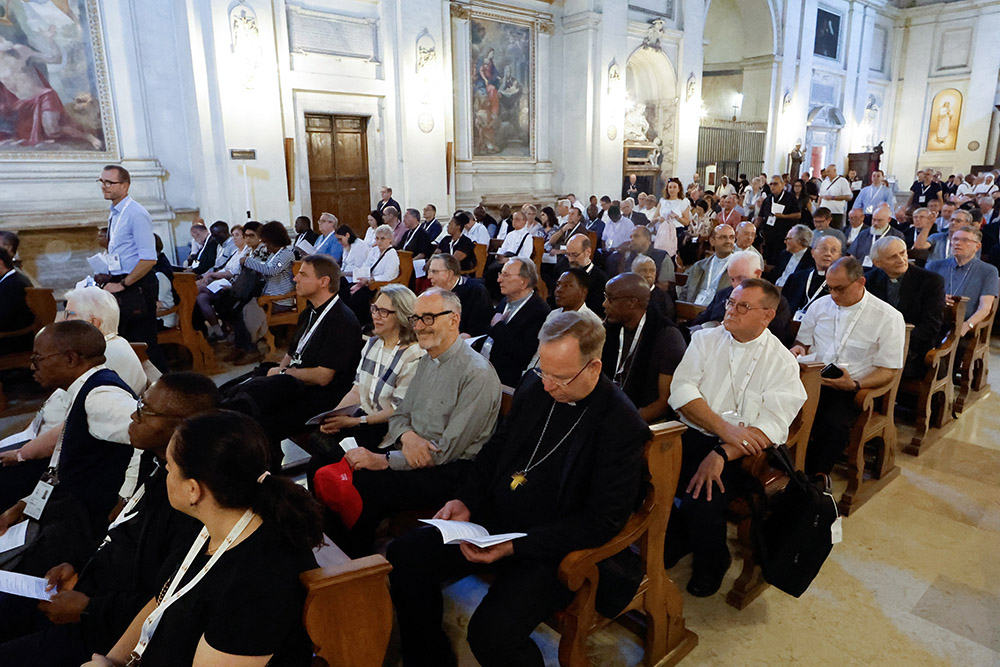
Participants in the assembly of the Synod of Bishops arrive to pray in Rome's Basilica of St. Sebastian as part of their pilgrimage to Rome's ancient catacombs Oct. 12. (CNS/Lola Gomez)
The second week of Pope Francis' closely watched summit on the future of the Catholic Church included emotional debates among bishops and lay delegates over whether the church's ministries could be expanded to include LGBTQ persons.
In interviews with multiple delegates from three different continents, NCR has confirmed that during the Synod of Bishop's Oct. 9-12 discussions on the theme of "communion," tensions began to emerge over how the church might extend its welcome to LGBTQ Catholics and whether use of the acronym "LGBTQ" was even appropriate.
For at least five years, Vatican documents have regularly used "LGBT" as a common acronym to refer to the gay community. Soon after his election in 2013, Francis became the first pontiff to regularly use the word "gay" to describe gay persons, rather than talk of people who experience "same-sex attraction," the term used by the Catechism of the Catholic Church.
According to the interviews, given under the condition of anonymity due to the synod's rules on confidentiality of the assembly's discussions, speeches about LGBTQ Catholics were given by delegates from a range of areas, including Eastern Europe, Africa and Australia. To varying degrees, the remarks expressed skepticism toward efforts to better integrate LGBTQ Catholics into the church's ministries.
Those interventions were then reportedly countered by several personal testimonials calling on the church to urgently reexamine its approach to LGBTQ persons, which were reportedly met by open applause from synod delegates.
Advertisement
During an Oct. 11 press briefing, the prefect of the Vatican's Dicastery for Communications, Paolo Ruffini, acknowledged some of these tensions, but said, "All agreed homophobia must be rejected."
While the synod sessions are generally being held in private, the Vatican is offering a livestream at the beginning of each phase of discussions.
The synod moved on to the next phase of its discussions on Oct. 13, with delegates now focusing on the theme of "mission." The role of women in ministry, including the possibility of the ordination of women to the diaconate, is expected to be part of those discussions.
Opening the new phase, Luxembourg Cardinal Jean-Claude Hollerich, one of the principal coordinators of the 2023 synod, said: "I have never read anywhere that the baptism of women would be inferior to the baptism of men."
"How can we ensure that women feel they are an integral part of this missionary church?" Hollerich asked.
"All the baptized are called and have the right to participate in the mission of the church; all have an irreplaceable contribution to make," said the Jesuit cardinal.
'Do we, the men, perceive the diversity and the richness of the charisms the Holy Spirit has given to women?'
—Cardinal Jean-Claude Hollerich
The cardinal directed the majority of his remarks that morning to men, acknowledging that bishops and priests face a particular challenge and "partiality" when considering how the church's ministries and structures might be expanded to better include women.
"Are we ready to accept that all parts of the body are important?" he asked. "Do we, the men, perceive the diversity and the richness of the charisms the Holy Spirit has given to women? Or the way that how we act often depends on our past education, our family upbringing and experience, or the prejudices and stereotypes of our culture?"
"Do we feel enriched or threatened when we share our common mission and when women are co-responsible in the mission of the church, on the basis of the grace of our common baptism?" he continued.
The cardinal went on to speak directly to his fellow bishops, warning that at times, members of the episcopacy risk becoming a self-referential echo chamber.
"We must be well aware of the degree and intensity of our involvement. And when we are so involved in a particular question or reality, we need even more the courage to take a step back to authentically listen to others, make room within ourselves for their word and ask what the Spirit is suggesting to us through them," he said.
Hollerich's remarks came after a week of small group discussions, followed by free-ranging discussion among the more than 450 synod members and theological experts.
Also speaking during the public session on Oct. 13 were Benedictine Sr. Maria Ignazia Angelini and Argentine theologian Fr. Carlos Galli.
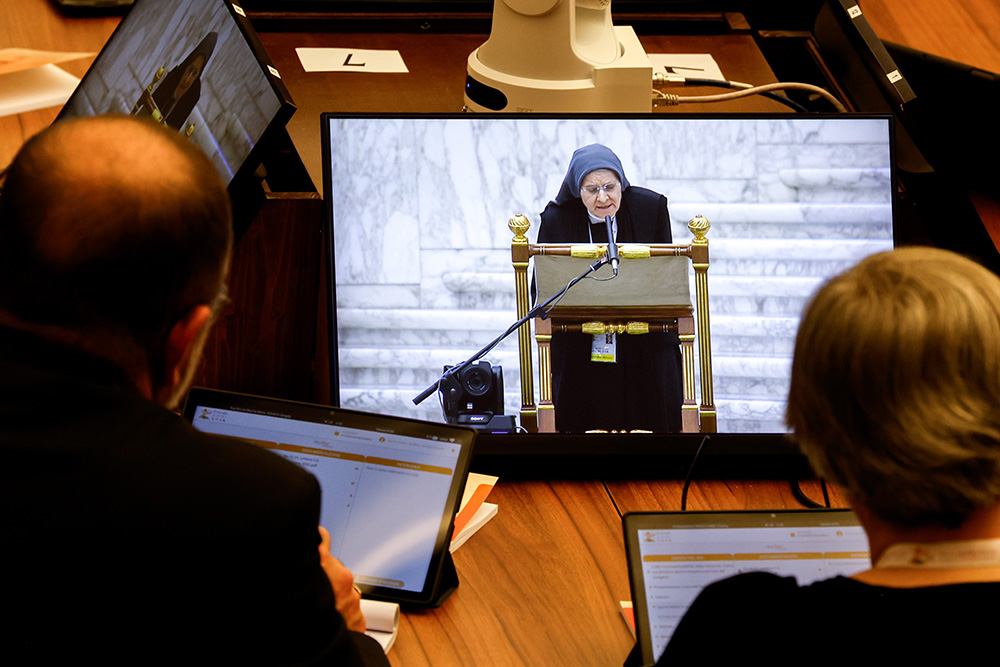
Benedictine Mother Maria Ignazia Angelini, a theologian, is seen on a video screen as she offers a biblical reflection at a working session of the assembly of the Synod of Bishops in the Vatican's Paul VI Audience Hall Oct. 13. (CNS/Lola Gomez)
In a biblical reflection on the theme of mission, Angelini spoke of women being the first at Christ's empty tomb after the resurrection, describing it as a "beginning ... without men."
"Women are dynamic elements of mission, like a presence that in critical, disruptive, unsettling passages senses the movement of life, weaves new, improbable relationships, patiently brings and dissolves conflicts," said Angelini. "It is not a question of rights but of gifts received."
Galli, who previously served as a member of the Vatican's International Theological Commission, said that "the baptized, both men and women, are called to share gifts and tasks in each local church."
Discussion on the current theme of "mission" will take place until Oct. 18.
During the confidential small group conversations, synod delegates are now expected to consider the following questions:
- How can we walk together toward a shared awareness of the meaning and content of mission?
- What should be done so a synodal church is also an "all ministerial" missionary church?
- How can the church of our time better fulfill its mission through greater recognition and promotion of the baptismal dignity of women?
- How can we properly value ordained ministry in its relationship with baptismal ministries in a missionary perspective?
- How can we renew and promote the bishop's ministry from a missionary synodal perspective?
[NCR news editor Joshua J. McElwee contributed to this report.]





